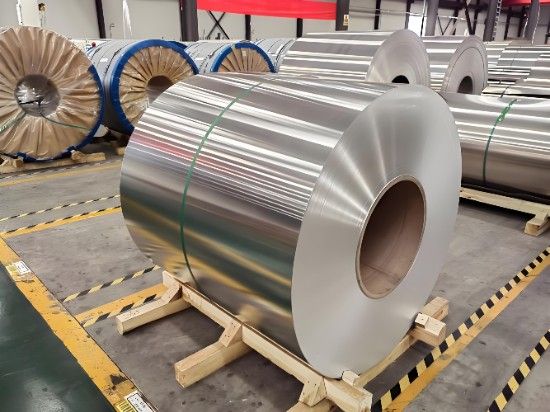1000 series pure aluminum coils are aluminum-based materials based on high-purity aluminum (aluminum content ≥99.00%). Typical grades include 1050, 1060, 1070 and 1100. 1060 aluminum, due to its balanced overall performance, holds over 60% of the market share. These aluminum alloys contain no additional strengthening elements and achieve strength through work hardening (such as in the H14 and H18 tempers), but cannot be heat-treated. 1xxx series pure aluminum coils are widely used in the electrical, chemical, food packaging, and building materials industries.

Typical Grade of 1000 Series Aluminum Coil
- 1050 aluminum coil
With an aluminum content ≥99.5%, it offers the lowest cost and best workability, making it suitable for general packaging, architectural decoration, and daily necessities.
- 1060 aluminum coil
With an aluminum content ≥99.6%, it boasts slightly higher strength than 1050 and stable corrosion resistance, making it suitable for electronic components, chemical containers, and food packaging. 1070
Aluminum content ≥99.7% for the highest purity and optimal conductivity, suitable for high-precision electronics and battery current collectors.
- 1100 aluminum coil
Aluminum content ≥99.0% with trace manganese (≤0.05%) for enhanced strength, suitable for kitchenware, lamps, and reflective panels.
Core Features of 1xxx Series Pure Aluminum Coil Are:
- High purity and single composition:
Contains no alloying elements (such as manganese and magnesium), simplifying the production process and reducing costs.
- Physical Properties:
Density: 2.7 g/cm³, only one-third that of steel, offering significant lightweighting advantages.
Excellent electrical and thermal conductivity: Electrical conductivity exceeds 60% of international standards, and thermal conductivity is approximately 237 W/(m·K), making it suitable for applications such as radiators and heat exchangers.
Ductility and plasticity: With an elongation of ≥25%, it can be easily processed into thin sheets, foils, or complex shapes. Corrosion Resistance: The natural oxide film on the surface resists atmospheric, water, and most chemical corrosion, but strong acid/alkaline environments require additional protection.
Processability: The O state (annealed state) boasts an elongation of up to 30%, making it easy to stamp, stretch, and bend. The H18 state (full hard) boasts a hardness of over HV60, making it suitable for structural components.
Surface Treatment of 1000 Series Pure Aluminum Coil:
- Coating Technology:
Polyester (PE), fluorocarbon (PVDF), or powder coatings can be used, with a dry film thickness of 16-25μm, meeting the weathering requirements of building curtain walls (such as those required by EN 10169).
- Anodizing:
The oxide film has a thickness of 8-25μm, enhancing wear resistance and decorative properties, and is commonly used on door and window profiles.
- Embossing and Brushing:
A roller-pressing process creates effects such as orange peel and diamond patterns, enhancing product value.
Industry Applications of 1xxx Series Pure Aluminum Coil
- Packaging Industry
Applications: Food foil, pharmaceutical packaging, industrial packaging, and daily chemical containers. Food and Pharmaceutical Packaging: 1060 aluminum foil (thickness 0.006-0.2mm) is food-grade certified and offers moisture-proof, light-proof, and odor-free benefits.
Industrial Packaging: 0.5-1.0mm aluminum coils are used to make packaging boxes, reducing weight by 50% compared to wooden boxes and are recyclable.
- Architecture and Decoration
Curtain Walls and Windows: 1050 H14 anodized aluminum coils are used in the curtain wall of a landmark building in Shanghai, with an annual usage exceeding 500 tons. They offer both weather resistance and aesthetics.
Pipe Insulation: 0.3-1.5mm aluminum coils replace traditional iron sheets for thermal insulation of heating pipes, extending their lifespan by 3-5 times.
- Electronics and Power
Heat Dissipation Components: 1060 aluminum coils (thickness 0.8-2.0mm) are used by new energy battery manufacturers to manufacture heat sinks for battery cases due to their high thermal conductivity (205W/m·K). The thickness tolerance is controlled to ±0.05mm. Conductive Materials: Wires and cables drawn from 1070 aluminum rod achieve a conductivity of 63% IACS and are suitable for high-voltage transmission lines.
- Industry and Transportation
Chemical Equipment: Reactor linings made from 1060 O-state aluminum coil offer superior corrosion resistance compared to stainless steel and a 30% cost reduction.
Automotive Lightweighting: 1100 aluminum coil, used in components such as engine hoods and hubcaps, reduces weight by over 30% compared to steel, improving fuel efficiency.
1000 series pure aluminum coil, with its high cost-effectiveness and versatility, continues to dominate the market amidst the trend toward lightweighting and environmental protection. In the future, with the advancement of recycling technologies and precision machining processes, its application in new energy, high-end manufacturing, and other fields will further expand.